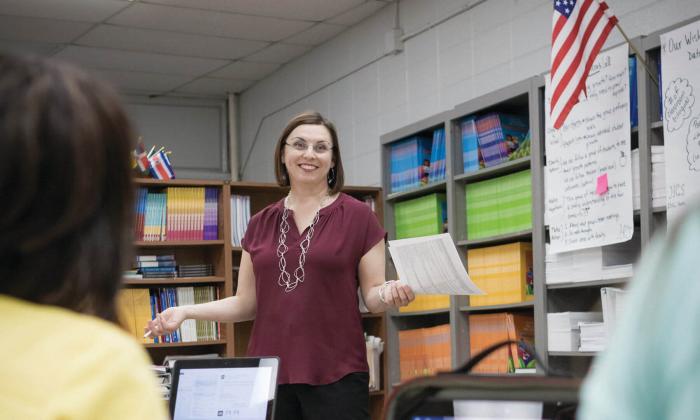
Ann Marie Batista is an innovative administrator and advocate for English language learners (ELLs) at Huntsville City Schools in Huntsville, Alabama. In her role as the English for speakers of other languages (ESOL) program specialist, Batista builds classroom teachers’ capacity to meet the needs of ELL students and fosters strong relationships with families.
What types of biases about ELL students have you observed in your role?
There remain many misconceptions about English learners, such as thinking you cannot be successful teaching an English learner if you can’t speak the language, or not understanding that English learners are on a language acquisition continuum, or confusing parent behavior when it does not match our cultural expectations. My team spends time advocating for these students and re-educating teachers and administrators as we encounter these issues.
We have wonderful educators in our school system, but sometimes you don’t know what you don’t know. If you are using your assumptions to inform your instruction, then it’s going to be a challenge for that student. … One little PD is not enough, right? It’s just a constant communication of, “You have to know who your student is.” We have immigrants, we have first- and second-generation students, unaccompanied youth. … The biggest bias is people thinking they know who their student is and where they’re coming from—and they don’t.
How do you ensure that ELL students’ noncurricular needs are identified and met?
Part of my work involves staying connected with other district departments and coordinators so that I can keep a pulse on district-level activities [and] advocate for our English learners as needed. For example, by participating in district staff meetings, I can help facilitate communication to our ELL families by gathering district communication early enough to have it translated so that parents can receive information in a language they understand.
We have also held ESL classes for parents for the last several years. … This is a great teaching opportunity for us to educate parents about their valuable role and rights to ask for a meeting so that they can stay informed or clear up any questions they have with the teacher or school.
What recommendations do you have for teachers who have ELL students in their classrooms?
Ask for help. Know that your student has strengths that you can work from, and it does require you get to know your student. Use instructional strategies or sheltered instruction to make your content comprehensible through visual supports, pre-teaching, native language support and so forth. Invite parents to visit and share a little about their culture with the class. Remember that your student is also a child, and not just an English learner. He or she wants to belong and be successful! There are so many wonderful resources at your fingertips to guide your understanding and to learn more about working with English learners. Two of my favorite sites are Colorín Colorado and WIDA.
What’s your favorite thing about your job?
One of my favorite things is hearing success stories. That is always very satisfying and helps us gauge: Are we on the right track? Are we doing the right thing? For example, we have a student, a sixth-grader, at one of our schools. She’s been in school since kindergarten, and we expect her to be doing better than she was doing in a couple of her classes. … The ESL teacher went to the teacher and said, “Listen, let’s really focus on giving her some strategies; she doesn’t know how to study. … Give me the test in advance so I can see how she needs to prepare, and we’ll work with her so that she can be more successful in your classroom.” After that, the student did great! She started getting Bs and As on her tests in the classroom. … It’s satisfying when an ESL teacher has a breakthrough. We can expect more from our kids, but we have to give them the tools to get there.
Ann Marie Batista coordinates the ESOL program in Alabama's Huntsville City Schools.
Know an excellent administrator, librarian or counselor we should interview?
Tell us all about them.